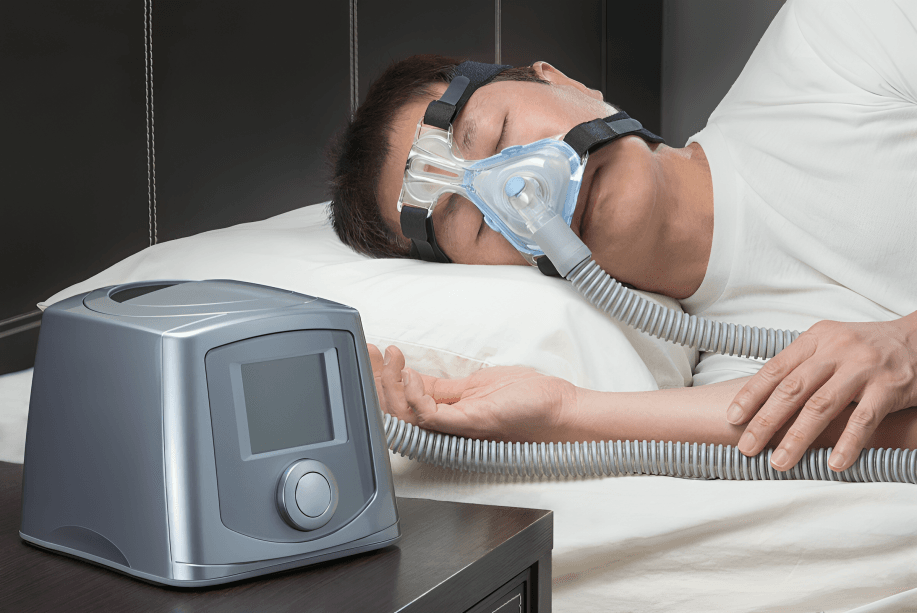
“
Sleep apnea and heart health are intricately linked, with numerous studies highlighting the significant impact this sleep disorder can have on cardiovascular well-being. Obstructive sleep apnea (OSA), the most common form, is characterized by repeated interruptions in breathing during sleep, leading to decreased oxygen levels and fragmented rest. 1
1
1
1
”
Doctors warn that untreated sleep apnea puts serious stress on the heart, increasing risks of high blood pressure, heart failure, stroke, and other cardiac events due to low oxygen levels. 1
People with sleep apnea face a higher risk of developing arrhythmias, particularly atrial fibrillation, which can disrupt normal heart rhythm and raise the chance of stroke or sudden cardiac issues. 2

Frequent nighttime awakenings from sleep apnea prevent deep rest, causing fatigue and hormonal imbalances that trigger inflammation, increase heart rate, and raise blood pressure over time.
Obstructive sleep apnea is a common cause of resistant hypertension, making it difficult to control blood pressure even with multiple medications and healthy lifestyle changes. 3
Constant low oxygen levels from sleep apnea can cause the walls of the heart’s left ventricle to thicken, making it harder for the heart to pump efficiently. 4
Sleep apnea triggers inflammation that damages the inner lining of blood vessels, increasing the risk of atherosclerosis, which narrows arteries and leads to heart attacks or strokes. 5
Apnea episodes cause the blood to become thicker and more prone to clotting, which can block arteries supplying the heart and result in potentially fatal cardiovascular events. 6
Many with untreated sleep apnea develop right-sided heart failure due to the increased pressure in the lungs’ arteries, which burdens the heart and limits oxygen delivery to tissues. 7
Reduced oxygen repeatedly activates the sympathetic nervous system, causing the body to remain in “fight or flight” mode, which continuously overburdens the cardiovascular system during rest. 8

Hormonal shifts triggered by poor sleep quality affect cholesterol levels and insulin sensitivity, leading to metabolic problems that raise heart disease risk significantly.
Sleep apnea increases nighttime angina, where the heart doesn’t receive enough oxygen during sleep, creating silent damage that may remain unnoticed until severe heart complications occur.9
Those with sleep apnea often experience early morning blood pressure spikes, putting them at greater risk for strokes or heart attacks during early waking hours. 10
Obesity, a common risk factor for sleep apnea, adds extra pressure on the chest and heart, intensifying breathing difficulties and straining the cardiovascular system with each passing night. 11
Individuals with coronary artery disease and sleep apnea tend to experience worse outcomes due to chronic oxygen starvation and added cardiovascular stress during the night. 12
Silent myocardial ischemia may occur in sleep apnea patients, where parts of the heart receive inadequate blood supply during sleep without causing pain or visible symptoms. 13

Continuous positive airway pressure (CPAP) therapy helps reduce heart strain by maintaining open airways during sleep, preventing oxygen drops, and easing the burden on the cardiovascular system.
Weight loss and improved fitness often reduce both the severity of sleep apnea and its harmful impact on the heart, creating a cycle of better sleep and heart health. 14
Many patients with heart problems unknowingly suffer from sleep apnea, making routine screening essential for early diagnosis and improved cardiac outcomes. 15
Heart rhythm disorders like bradycardia and tachycardia are more common among those with severe sleep apnea, often requiring long-term monitoring and therapy for proper heart function. 16
Philosophers stress harmony in body and mind; modern science now confirms that deep, uninterrupted sleep is essential to heart strength, longevity, and a healthy cardiovascular rhythm. 17


